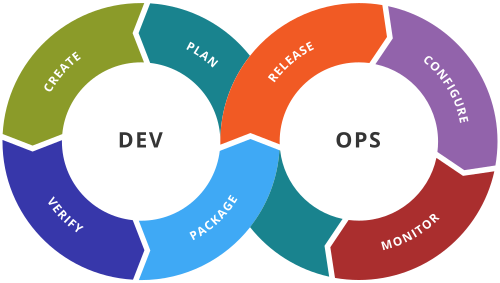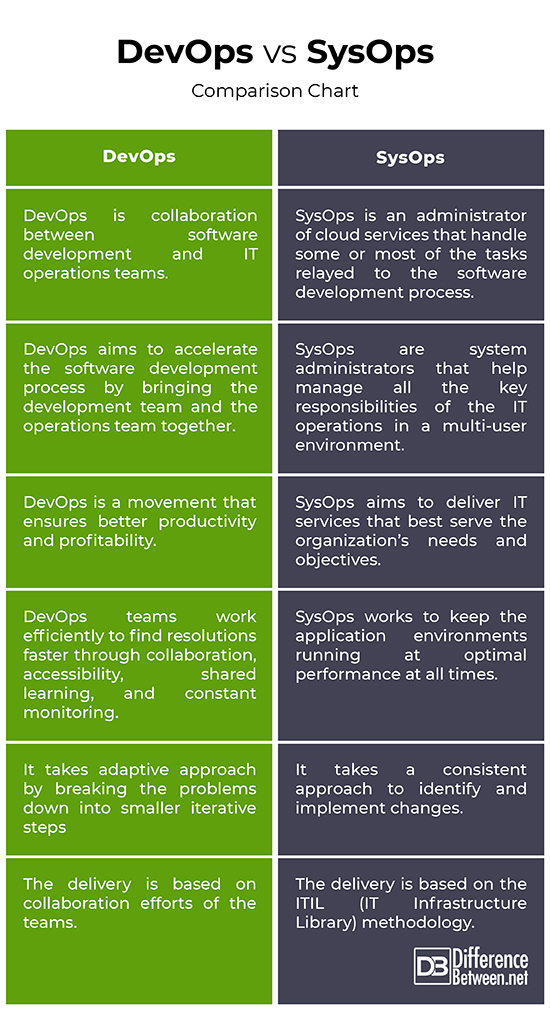Difference Between DevOps and SysOps
There is no exact science when it comes to software development and project management. The software development process is not always a smooth ride. There are many problems that come along the way and when the issues come, they can be disastrous. Plus, software development life cycle is not without its flaws. Mistakes are made during the process, which can affect the progress of the projects. One of the most common mistakes management make in such cases is that they put in additional workforce to tackle with the issues. But, more people mean more room for errors and slow downs. A better collaboration would be required so that the teams come together and address the issues collectively.

What is DevOps?
DevOps is a bold new move adopted by the software organizations around the world to create and ship software. It is a broad philosophy that has transformed the way teams collaborate to build and deploy software. DevOps is a movement that inspires diverse implementations across the organization. It is a practice that aims to bring the software development and IT operations teams together to ensure a more transparent and collaborative workflow from start to production. It is a concept that keeps the teams in sync at all times, thereby eliminating bottlenecks and improving productivity. It intends to build a culture of trust, transparency, collaboration and improvement.

What is SysOps?
SysOps is an abbreviation for systems operations. SysOps is used to refer to system administrators who help manage all the key responsibilities of the whole IT infrastructure within an organization, particularly in a multi-user environment. It is basically an operator or administrator of cloud services. Traditionally, the term was used to refer to the ones who manage computer systems. However, with the advancement in technology and the worldwide adoption of cloud, the role of a system operator has broadened. Simply put, a system operator is the one who manages day-to-day operations of servers, security systems and is responsible for providing the required knowledge that goes into managing the cloud infrastructure of an organization.
Difference between DevOps and SysOps
Role
– DevOps is a bold new practice of effective collaboration designed to bridge the gap between development teams and IT operations with the goal to accelerate the software development life cycle from start to finish. DevOps was borne from the agile system administration movement and the enterprise systems management (ESM) as a movement to ensure better productivity and profitability. SysOps, on the other hand, are system administrators that help manage all the key responsibilities of the IT operations in a multi-user environment. SysOps is particularly an administrator of cloud services that handle some or most of the tasks relayed to the software development process.
Delivery
– DevOps aims to accelerate the software development process by bringing in the development team and the operations team together in order to build trust, improve collaboration and thereby increasing productivity. The result depends on how fast and better the teams coordinate so that to minimize the friction in the handoffs between the two teams. The delivery is solely based on their collaboration efforts. SysOps, on the other hand, takes a different approach based on the ITIL (IT Infrastructure Library) methodology to deliver cost-effective IT service management (ITSM). SysOps aims to deliver IT services that best serve the organization’s needs and objectives.
Responsiveness
– DevOps is all about collaboration. Through improved collaboration and automation, DevOps team is able to make small and frequent changes by breaking the problems down into smaller iterative steps. It requires effective consensus between the two teams and together they work to fix the problem as they come. SysOps, on the other hand, is more reactive to a rapidly changing business environment, taking a consistent approach to identify and implement changes. SysOps is not as flexible to rapid changes as the DevOps because of its limited scope and traditional approach to change management.
Scope
– DevOps aims to improve visibility across the CI/CD pipeline in order to remove many of the bottlenecks that teams often come across throughout the software development process. DevOps teams work efficiently to find resolutions faster through collaboration, accessibility, shared learning, and constant monitoring. The scope of DevOps lies in the interests of the organization which allows them to improve organizational performance and increase productivity. SysOps works to keep the application environments running at optimal performance at all times. This involves deploying, monitoring, optimizing, and securing systems.
DevOps vs. SysOps: Comparison Chart

Summary
DevOps is a bold move that makes sure everybody is on the same page when it comes to organizational priorities and business objectives. For any software development process to be successful, the working teams must work collaboratively towards the common goal. This way project will run as smoothly as possible and this leads to improved performance and better productivity. DevOps is a movement that inspires diverse implementations across the organization. SysOps are system administrators that handle and manage the day-to-day IT operations of an organization including deploying, monitoring, optimizing, and securing systems.
- Difference Between Caucus and Primary - June 18, 2024
- Difference Between PPO and POS - May 30, 2024
- Difference Between RFID and NFC - May 28, 2024
Search DifferenceBetween.net :
Leave a Response
References :
[0]Perrott, Sara and Brett McLaughlin. AWS Certified SysOps Administrator Study Guide: Associate (SOA-C01) Exam. New Jersey, United States: John Wiley & Sons, 2020. Print
[1]Freeman, Emily. DevOps for Dummies. New Jersey, United States: John Wiley & Sons, 2019. Print
[2]Kim, Gene et al. The DevOps Handbook: How to Create World-Class Agility, Reliability, and Security in Technology Organizations. Portland, United States: IT Revolution Press, LLC, 2016. Print
[3]Cole, Stephen et al. AWS Certified SysOps Administrator Official Study Guide: Associate Exam. New Jersey, United States: John Wiley & Sons, 2017. Print
[4]Image credit: https://upload.wikimedia.org/wikipedia/commons/thumb/0/05/Devops-toolchain.svg/500px-Devops-toolchain.svg.png
[5]Image credit: https://upload.wikimedia.org/wikipedia/commons/5/57/SysOps_Logo.png
